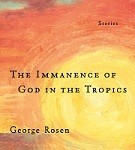Review of George Rosen (Kenya 1968-70) The Immanence of God in the Tropics
 The Immanence of God in the Tropics
The Immanence of God in the Tropics
by George Rosen (Kenya 1968-70)
Leapfrog Press
$15.95
167 pages
2012
Reviewed by Susi Wyss (Central African Republic 1990-92)
All seven stories in George Rosen’s new collection, The Immanence of God in the Tropics, were previously published in top-notch literary magazines such as Harper’s and North American Review. After a bit of online research, I was surprised to learn that these stories were published over a 31-year period, starting with “Our Big Game” (published in 1978) and ending with “A Second Language” (published in 2009). Of course, Rosen produced plenty of other work during that time, including a novel called Black Money and reportage for the Atlantic and the Boston Globe. But I can’t help think that the long period over which these stories were written attest to the labor and care-not to mention sheer life experience-that is so evident in this impressive collection. Moreover, it highlights the timelessness of his stories, since even the ones from the 1970s and 1980s read like fresh fiction.
Three of the stories in the collection are set in Kenya, two in New England, one in Mexico, and one off the coast of East Africa. All of them feature male protagonists grappling with their shortcomings and sense of mortality, often in the form of an internal crisis, such as a man visiting Mexico after his divorce, a group of men at a sauna mourning a friend’s death, and-in the title story-a missionary from the 19th century wrestling with his understanding of God. National Book Award finalist Edith Pearlman referred to Rosen’s collection as an “unpretentious book…[by] a master,” but most of all, it is his characters who are unpretentious, full of self-doubt and failings, unsure of their place in the world, and seemingly out of touch with-or afraid of-their own feelings.
Some of the book’s unpretentiousness may also be due to the fact that even as his characters grapple with serious issues, Rosen affectionately pokes fun at them. The following excerpt from “A Good White Hunter,” a story about a mzungu in Kenya, demonstrates his subtle sense of humor and playfulness with language:
Atherton had three wives. The first was a matter of love and need. The others, from his point of view, were hardly intentional, a confusing set of obligations he had fallen upon the way a lizard might walk into a child’s banana-leaf snare, for lack of adequate peripheral vision.
The power of memory plays a recurring role in the book, as in “A Second Language,” in which an American man staying in Mexico tries to reboot his life after a divorce. He had visited Mexico with his wife in happier days, and has come back to both remember and forget; it is only an old memory of a shopping trip among clay pots that finally helps him move forward. In another story, a group of men sit around talking in a sauna after a friend’s funeral, and one of the characters shares an old memory of an incident in Mexico during which a child nearly drowned. Memory links the death of the man’s friend with the boy’s survival, and the reader is reminded that life and death are two sides of the same coin. The fact that three of Rosen’s stories were set in Kenya, where he served as a Peace Corps volunteer, made me wonder how much power his own memories might hold over him. If those memories helped produce stories as beautiful as these, I’m glad that they kept their hold on him for so long.
Susi Wyss is the author of The Civilized World, a novel in stories set across Africa that received the 2011 Maria Thomas Fiction Award from Peace Corps Writers and was named a “Book to Pick Up Now” by O, the Oprah Magazine. You can find her online at: www.susiwyss.com.
No comments yet.
Add your comment